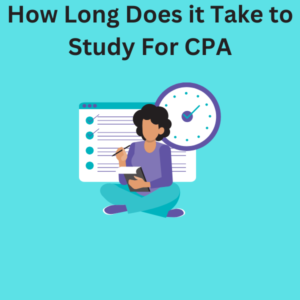Studying for the Certified Public Accountant (CPA) exam is no small task. It’s a rigorous journey that requires dedication, planning, and effective time scheduling. The CPA exam, which is known for its challenging content, is divided into four sections: Financial Accounting and Reporting (FAR), Auditing and Attestation (AUD), Regulation (REG), and Business Environment and Concepts (BEC). Each of these sections covers distinct topics, ranging from financial accounting and federal taxation to business law and professional responsibilities.
Successfully preparing for the CPA exam involves creating a structured study schedule and committing a significant number of hours to cover each topic thoroughly. If you’re wondering, how long does it take to study for the CPA, the answer varies depending on the individual’s learning style, availability, and study methods.
This guide will walk you through the typical CPA exam journey, giving you a clearer picture of what to expect and how to plan your preparation.

CPA Exam Study Time Overview
The CPA exam is known for being intense, requiring CPA candidates to dive deep into advanced topics in accounting, tax laws, and business analysis. It’s recommended that candidates spend between 300 to 400 hours studying for the entire exam, though this number can vary based on each individual’s background in accounting.
For each of the four sections, here is a general guideline for how many hours to allocate:
- Financial Accounting and Reporting (FAR): 100–120 hours
- Auditing and Attestation (AUD): 70–90 hours
- Regulation (REG): 90–110 hours
- Business Environment and Concepts (BEC): 60–80 hours
These recommended study hours take into account the exam’s task-based simulations, and other aspects that require a thorough understanding of detailed content.
Factors Affecting CPA Exam Preparation Time
Different factors play into how long it takes to study for the CPA exam. Here are some key considerations:
- Prior Knowledge and Background: Those with a strong background in accounting or relevant work experience may find certain sections easier, allowing them to spend fewer hours preparing for those topics.
- Study Schedule: Full-time students may dedicate more hours per week compared to those balancing a regular job. For working professionals, finding a balance between work, personal life, and study commitments is essential.
- Learning Style: Some CPA candidates prefer self-study, while others benefit from review courses like the Roger CPA Review. Courses often offer structured guidance, practice questions, and mock exams that can save time by focusing on essential concepts covered on the test.
- Study Materials: Using a variety of study materials—such as CPA review books, online courses, and practice tests—can make the studying process more effective. Candidates who utilize them and focus on task-based simulations may find they gain a deeper understanding of the material, potentially shortening study time.
- Section Difficulty: Many candidates find FAR and REG to be the most difficult sections, requiring more study hours to master topics like federal taxation, financial accounting, and tax compliance. Other sections, like BEC, may take fewer hours depending on the candidate’s comfort with business environment and information systems topics.
Creating a CPA Exam Study Schedule
To keep on track, many CPA candidates create a study schedule, often studying for about 15–20 hours per week. This pace allows candidates to cover all the material in a few months per section. For those with a regular job, it might take longer due to other commitments, but with effective time management, it’s achievable.
Suggested Study Plan
- Week 1-3: Review basic concepts in financial accounting, business law, and taxation.
- Week 4-6: concetrate on more advanced subjects, such as federal tax procedures and compliance.
- Week 7-9: Complete practice exams and review task-based simulations for each section.
- Week 10-12: Focus on any difficult sections, especially if FAR or REG requires more study hours.
Throughout this period, using multiple choice questions and practice tests can help identify areas needing more focus. Candidates who stick to a study plan often find it easier to retain information and balance their study process with other life responsibilities.
Frequently Asked Questions (FAQs)
Q: How long does it take to study for the CPA exam?
A: Most candidates spend between 300 to 400 hours studying for the CPA exam in total, typically over 6–12 months, depending on other life commitments.
Q: How many hours per week should I dedicate to CPA exam preparation?
A: A rule is to study 15–20 hours per week. Adjust this based on your availability and whether you have a regular job or other obligations.
Q: Which section of the CPA exam is the hardest?
A: FAR and REG are often considered the most challenging sections due to the depth of knowledge required in financial accounting and taxation. These sections may need extra study time and focused preparation.
Q: Do I need a CPA review course?
A: While not required, CPA review courses like Roger CPA Review can provide structured guidance, practice questions, and other resources, which can be especially helpful for time management and covering advanced topics.
Q: How can I manage studying for the CPA exam with a full-time job?
A: Balancing work and study requires a structured schedule, setting weekly study goals, and possibly extending the timeline to accommodate fewer weekly study hours. This approach can make it manageable even with a full-time job.
Q: How do I know when I’m ready to take each exam section?
A: Regularly practicing with multiple-choice questions, task-based simulations, and mock exams will help you assess readiness. When you’re scoring consistently well on practice tests and feel confident in the concepts, you’re likely ready.
